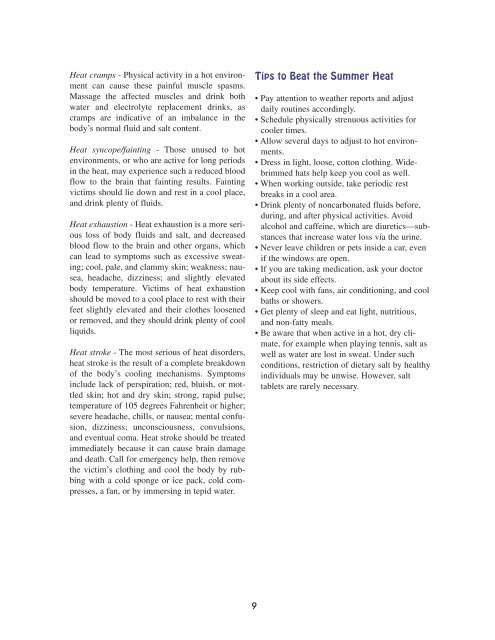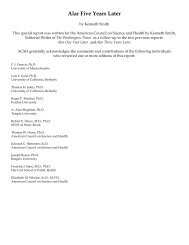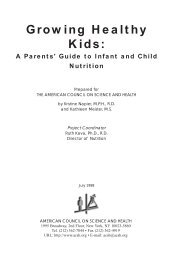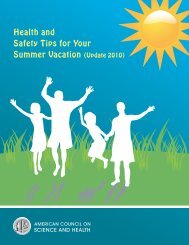View pdf - American Council on Science and Health
View pdf - American Council on Science and Health
View pdf - American Council on Science and Health
Create successful ePaper yourself
Turn your PDF publications into a flip-book with our unique Google optimized e-Paper software.
Heat cramps - Physical activity in a hot envir<strong>on</strong>ment<br />
can cause these painful muscle spasms.<br />
Massage the affected muscles <strong>and</strong> drink both<br />
water <strong>and</strong> electrolyte replacement drinks, as<br />
cramps are indicative of an imbalance in the<br />
body’s normal fluid <strong>and</strong> salt c<strong>on</strong>tent.<br />
Heat syncope/fainting - Those unused to hot<br />
envir<strong>on</strong>ments, or who are active for l<strong>on</strong>g periods<br />
in the heat, may experience such a reduced blood<br />
flow to the brain that fainting results. Fainting<br />
victims should lie down <strong>and</strong> rest in a cool place,<br />
<strong>and</strong> drink plenty of fluids.<br />
Heat exhausti<strong>on</strong> - Heat exhausti<strong>on</strong> is a more serious<br />
loss of body fluids <strong>and</strong> salt, <strong>and</strong> decreased<br />
blood flow to the brain <strong>and</strong> other organs, which<br />
can lead to symptoms such as excessive sweating;<br />
cool, pale, <strong>and</strong> clammy skin; weakness; nausea,<br />
headache, dizziness; <strong>and</strong> slightly elevated<br />
body temperature. Victims of heat exhausti<strong>on</strong><br />
should be moved to a cool place to rest with their<br />
feet slightly elevated <strong>and</strong> their clothes loosened<br />
or removed, <strong>and</strong> they should drink plenty of cool<br />
liquids.<br />
Heat stroke - The most serious of heat disorders,<br />
heat stroke is the result of a complete breakdown<br />
of the body’s cooling mechanisms. Symptoms<br />
include lack of perspirati<strong>on</strong>; red, bluish, or mottled<br />
skin; hot <strong>and</strong> dry skin; str<strong>on</strong>g, rapid pulse;<br />
temperature of 105 degrees Fahrenheit or higher;<br />
severe headache, chills, or nausea; mental c<strong>on</strong>fusi<strong>on</strong>,<br />
dizziness; unc<strong>on</strong>sciousness, c<strong>on</strong>vulsi<strong>on</strong>s,<br />
<strong>and</strong> eventual coma. Heat stroke should be treated<br />
immediately because it can cause brain damage<br />
<strong>and</strong> death. Call for emergency help, then remove<br />
the victim’s clothing <strong>and</strong> cool the body by rubbing<br />
with a cold sp<strong>on</strong>ge or ice pack, cold compresses,<br />
a fan, or by immersing in tepid water.<br />
9<br />
Tips to Beat the Summer Heat<br />
• Pay attenti<strong>on</strong> to weather reports <strong>and</strong> adjust<br />
daily routines accordingly.<br />
• Schedule physically strenuous activities for<br />
cooler times.<br />
• Allow several days to adjust to hot envir<strong>on</strong>ments.<br />
• Dress in light, loose, cott<strong>on</strong> clothing. Widebrimmed<br />
hats help keep you cool as well.<br />
• When working outside, take periodic rest<br />
breaks in a cool area.<br />
• Drink plenty of n<strong>on</strong>carb<strong>on</strong>ated fluids before,<br />
during, <strong>and</strong> after physical activities. Avoid<br />
alcohol <strong>and</strong> caffeine, which are diuretics—substances<br />
that increase water loss via the urine.<br />
• Never leave children or pets inside a car, even<br />
if the windows are open.<br />
• If you are taking medicati<strong>on</strong>, ask your doctor<br />
about its side effects.<br />
• Keep cool with fans, air c<strong>on</strong>diti<strong>on</strong>ing, <strong>and</strong> cool<br />
baths or showers.<br />
• Get plenty of sleep <strong>and</strong> eat light, nutritious,<br />
<strong>and</strong> n<strong>on</strong>-fatty meals.<br />
• Be aware that when active in a hot, dry climate,<br />
for example when playing tennis, salt as<br />
well as water are lost in sweat. Under such<br />
c<strong>on</strong>diti<strong>on</strong>s, restricti<strong>on</strong> of dietary salt by healthy<br />
individuals may be unwise. However, salt<br />
tablets are rarely necessary.










